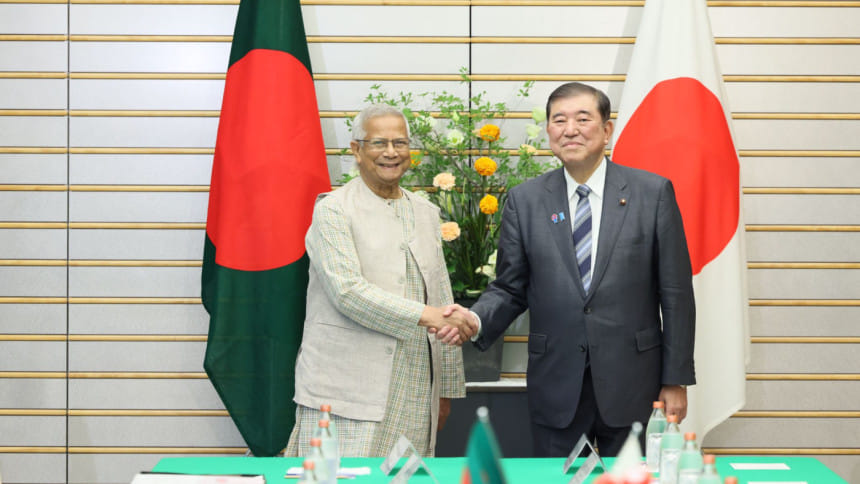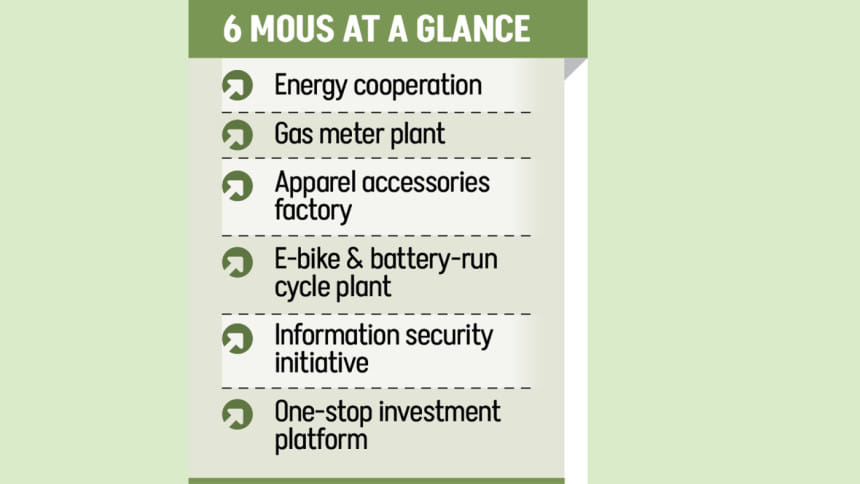Japan to provide $1b in budget support, grant

Japan will provide $1.063 billion to Bangladesh in loans and grants for budget support, railway upgradation and scholarships, reaffirming its full support for the interim government's reform agenda and commitment to a peaceful political transition.
The agreements were signed in Tokyo by Bangladesh Ambassador Md Daud Ali and Japanese Ambassador Shinichi Saida, reflecting both nations' resolve to deepen their strategic partnership for peace, stability, and shared prosperity, according to the press wing of the Chief Adviser's Office.

Of the total package, $418 million will be provided as a Development Policy Loan to support economic reforms and climate resilience, $641 million will fund the upgrade of the Joydevpur-Ishwardi rail line to a dual-gauge double track, and $4.2 million in grants will go toward scholarships.
The deals were formalised on the sidelines of a bilateral meeting between Chief Adviser Prof Muhammad Yunus and Japanese Prime Minister Ishiba Shigeru. Yunus, on a four-day visit to Japan since May 28, received a guard of honour ahead of the meeting and presented Ishiba with the graffiti book "Art of Triumph", chronicling the July uprising in Bangladesh.
During his visit, Yunus addressed the Nikkei Asia Forum and participated in a series of meetings and seminars with Japanese officials, business leaders, and the Bangladeshi diaspora. He is scheduled to return home today.
Six additional Memoranda of Understanding (MoUs) were signed yesterday during the Bangladesh Business Seminar in Tokyo, aimed at bolstering economic and investment cooperation.The MoUs in focus are on energy cooperation, industrial expansion, textile accessories, green mobility, cybersecurity investment, and digital integration.
The Japan Bank for International Cooperation (JBIC) and Bangladesh's energy and mineral resources ministry agreed to strengthen collaboration on energy projects.
Japanese firm ONODA Inc signed a land lease agreement with Bangladesh Special Economic Zone (BSEZ) to expand its gas meter assembly manufacturing, inspection, and maintenance operations.
Bangladesh Naxis Co Ltd signed an MoU with BSEZ Ltd to establish a factory producing apparel accessories.
Glafit and Musashi Seimitsu Industry, in partnership with the Bangladesh Investment Development Authority (BIDA), will support the construction of a plant to manufacture battery-powered cycles and electric motorcycles.
Cipher Core Co Ltd committed $20 million to launch a national pilot project using Complete Cipher Technology by inventor Takatoshi Nakamura, aiming to position Bangladesh as a quantum-resilient digital economy, with exclusive rights granted to the local entity for technology deployment and global expansion.
JICA and BIDA signed an agreement for early-stage technical and in-kind support for the Integrated Single Window Platform (ISWP), designed to unify investment-related services across various agencies.
Addressing the event, Yunus congratulated all parties involved and said, "Now it is our task to implement. I am moved."
He said what happened in the country in the past 16 years left nothing in shape, and in this situation, Japan came up as a good friend.
"I came here to thank you and design the next step," he said. "We want to show the history that it was done, done in a perfect way. We have kind of tightened our belt and say here we are to work. With your support, it is doable."
"Let's put our hands together and execute it …. It's not about making money. It's about changing people's lives," he said.
Speakers at the event included Shinji Takeuchi, Japan's parliamentary vice-minister of economy, trade and industry; Norihiko Ishiguro, chairman and CEO of JETRO; and Fumiya Kokubu, chair of the Japan-Bangladesh Committee for Commercial and Economic Cooperation.
On Thursday, both nations inked MoUs on training and employing Bangladeshi skilled workers, with projections that Japan may hire up to 100,000 workers from Bangladesh over the next five years amid a growing labour shortage.
During the bilateral talks, Yunus and Ishiba emphasised the need to conclude the Economic Partnership Agreement (EPA) soon, with expectations that it will enhance investment and trade and secure duty- and quota-free access for Bangladeshi products after LDC graduation, a foreign ministry official said.
Current bilateral trade stands at around $4 billion. Since Bangladesh's independence, Japan has provided more than $24 billion in loans and grants. A foreign ministry official noted, "Bangladesh can get a lot of Japanese investments if we can truly improve our business environment."
The two countries reaffirmed their political and security cooperation, including the early delivery of five patrol boats to the Bangladesh Navy under Japan's Official Security Assistance. They also agreed in principle to the Agreement Concerning the Transfer of Defence Equipment and Technology, hoping for its early signing.
Both leaders reiterated their commitment to the strategic partnership and a shared vision for a free and open Indo-Pacific, grounded in peace, stability, rule of law, and multilateralism.
Yunus expressed gratitude for Japan's sustained development support, particularly under the Bay of Bengal Industrial Growth Belt (BIG-B) initiative. Ishiba lauded Bangladesh's efforts in temporarily sheltering the Rohingya refugees.
Both sides agreed that the ultimate resolution of the Rohingya crisis lies in their safe, voluntary, and dignified return to Myanmar, and emphasised the need for sincere dialogue among all stakeholders.
Ishiba described Bangladesh as a "long-standing friend" and pledged Tokyo's continued support during the country's democratic transition. "Bangladesh plays a critical role in regional stability," he said, highlighting its importance in ensuring peace across the Indo-Pacific, according to the CA's Press Wing.
He paid tribute to Yunus, expressing confidence that Bangladesh would usher in a new era under his leadership. "Japanese people have profound respect for you," Ishiba added.
Yunus thanked Japan for its "unwavering support" over the past 10 months, noting the difficult inheritance left by the previous regime.
He emphasised Bangladesh's commitment to a free, open and inclusive Indo-Pacific, and expressed readiness to work with Japan on maritime security, sustainable marine resource management, enhanced connectivity, and the fight against transnational crimes.
The chief adviser outlined a series of infrastructure and trade proposals, seeking Japanese support for a land-based LNG terminal at Matarbari and an import-based LPG terminal at Moheshkhali.
He also sought support for duty- and quota-free access for Bangladeshi exports for at least three years after LDC graduation in 2026; soft loans to upgrade the Dhaka-Chattogram highway into a six-lane access-controlled expressway; upgradation of the Chattagram-Cox's Bazar highway; and a new four-lane bridge over the Meghna-Gomti river.
He invited Japanese investment in sectors such as automobiles, electric vehicles, light machinery, high-tech electronics, and solar energy, proposing integration into Japan's industrial value chains.
Yunus urged Tokyo to launch a skilled workforce partnership programme, saying it could help fill Japan's labour shortages and open opportunities for "hundreds of thousands" of Bangladeshi workers.
Additionally, he requested an increase in scholarships and opportunities for Bangladeshi students and vocational training instructors to study in Japan.
Ishiba assured that Tokyo would continue to assist Bangladesh in overcoming its current challenges. He recalled his own visit to Bangladesh 38 years ago for the inauguration of the Japan-funded Jamuna Multipurpose Bridge, and expressed his intention to visit Bangladesh at a mutually convenient time.

 For all latest news, follow The Daily Star's Google News channel.
For all latest news, follow The Daily Star's Google News channel. 





Comments